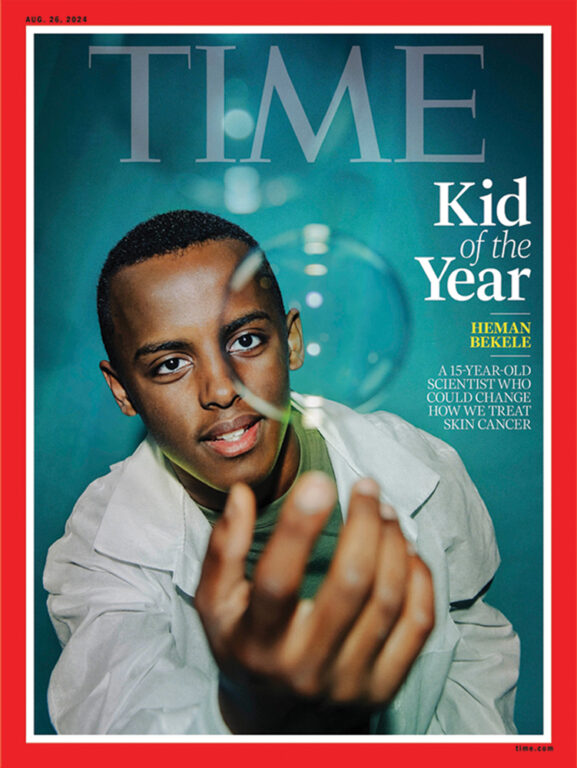TIME Magazine's 2024 Kid of the Year Heman Bekele

When he was just 7 years old Heman Bekele had a fascination for “potions” mixing up whatever he could get his hands on at home “Dish soap, laundry detergent, and common household chemicals,” he says of the ingredients he’d use. “I would hide them under my bed and see what would happen if I left them overnight. There was a lot of mixing together completely at random.” He had been given a chemistry set that came with a sample of sodium hydroxide and began looking up chemical reactions online. He learned that aluminum and sodium hydroxide could together produce heat and almost started a fire.
After that, his parents kept a closer eye on him and having adults watch what he does is something that Heman, now 15, would get used to. These days, a whole lot of people are paying him a whole lot of attention. Last October, the 3M company and Discovery Education selected Heman, a rising 10th-grader at Woodson High School in Fairfax County, Virginia, as the winner of its Young Scientist Challenge. His prize: $25,000. His accomplishment: inventing a soap that could one day treat and even prevent multiple forms of skin cancer.
It may take years before such a product comes to market, but this summer Heman is spending part of every weekday working in a lab at the Johns Hopkins Bloomberg School of Public Health, Baltimore, hoping to bring his dream to fruition. “I’m really passionate about skin-cancer research,” he says, “whether it’s my own research or what’s happening in the field. It’s absolutely incredible to think that one day my bar of soap will be able to make a direct impact on somebody else’s life. That’s the reason I started this all in the first place.”
Born in Addis Ababa before emigrating to the U.S. with his family when he was 4, Heman’s earliest memories were of seeing laborers working in the blistering sun, with no protection for their skin. His parents taught him and his sisters about the dangers of too much time outdoors without sunscreen or proper clothing.”When we came to America, I realized what a big problem the sun and ultraviolet radiation is when you’re exposed to it for a long time,” Heman says. He started to think about how he might help. And read about imiquimod, a drug that can help destroy tumors and usually comes in the form of a cream, prescribed as part of a cancer treatment plan.Heman wondered if it could be made available more easily to people in the earliest stages of the disease. A bar of soap, he reckoned, might be just the delivery system for such a lifesaving drug, not just because it was simple, but because it would be a lot more affordable than the $40,000 it typically costs for skin-cancer treatment. It’s that ambition—to say nothing of that selflessness—that has earned Heman recognition as TIME’s Kid of the Year for 2024.
There was only so much Heman could do on his own, but in 2023, he submitted a video explaining his idea to the 3M challenge,went to the company’s HQ in St. Paul, Minn., to deliver a pitch in front of a panel of judges and won the $25,000 prize. However he still needed a professional lab in which to work and that opportunity arrived when he attended a networking event hosted by the Melanoma Research Alliance. There he met Vito Rebecca, a molecular biologist at Johns Hopkins in Baltimore who says: “I remember reading somewhere about this young kid who had an idea for a skin-cancer soap, and I thought, how cool,to make it accessible to the whole world.” After meeting Herman Rebecca agreed to sponsor him and invited him to work at the Baltimore lab between schoolwork..
Since then Heman and Rebecca have been researching mice, injecting them with strains of skin cancer and preparing to apply the lipid-bound, imiquimod-infused soap to see what the results are.Heman says “there’s still a long way to go”—not just testing the soap, but also patenting it and getting FDA certification, which can take a decade altogether. It is a measure of Heman’s enormous head start that when that decade passes, he will still be only 25 years old—the age at which medical students have not even completed their postgrad education. He says “A lot of people have this mindset that everything’s been done, there’s nothing left to do. To anybody having that thought, [I’d say] we’ll never run out of ideas in this world. Just keep inventing. Keep thinking of new ways to improve our world and keep making it a better place.”
